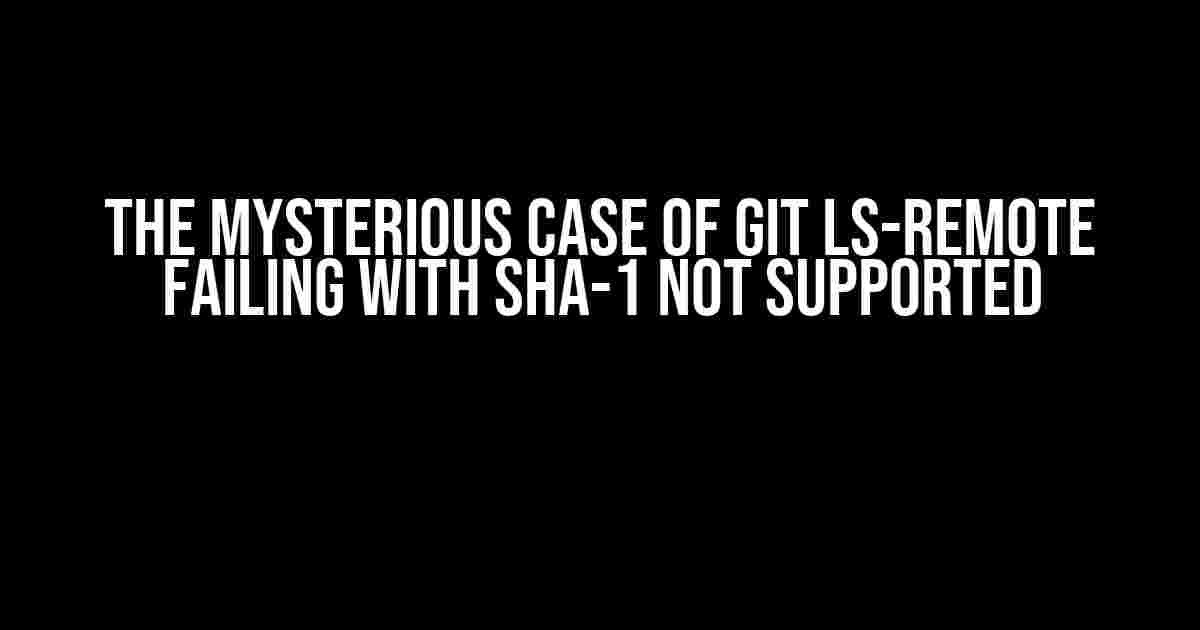Have you ever encountered the frustrating error “SHA-1 not supported” when trying to use Git ls-remote with a tunneled SSH session to connect to GitHub? You’re not alone! In this article, we’ll delve into the mysterious world of SSH tunneling, Git, and SHA-1 to uncover the root cause of this issue and provide a step-by-step solution to get you back on track.
The Problem: Git ls-remote Fails with SHA-1 Not Supported
Let’s set the scene: you’re working on a project, and you need to retrieve information about a remote Git repository using Git ls-remote. You’ve set up an SSH tunnel to connect to GitHub, but when you run the command, you’re greeted with the ominous error message:
fatal: remote error: SHA-1 not supportedYou’ve checked your SSH configuration, verified your credentials, and even tried re-cloning the repository, but the error persists. What’s going on?
The Culprit: SSH Tunneling and SHA-1 Deprecation
The issue lies in the way SSH tunneling interacts with Git’s use of SHA-1, a cryptographic hash function. SHA-1 has been deprecated due to security concerns, and many servers, including GitHub, have started to phase it out in favor of more secure alternatives like SHA-256 and SHA-512.
When you establish an SSH tunnel, the connection is encrypted using the default SSH cipher suite, which may include SHA-1. However, when Git tries to communicate with the remote repository, it uses its own set of cryptographic algorithms, which may still rely on SHA-1. This mismatch causes the “SHA-1 not supported” error.
The Solution: Forcing a More Secure Cipher Suite
So, how do we get around this issue? The solution is to force the SSH tunnel to use a more secure cipher suite that doesn’t rely on SHA-1. We can do this by specifying the cipher suite explicitly when establishing the SSH connection.
Step 1: Identify the Supported Cipher Suites
First, we need to determine which cipher suites are supported by the GitHub SSH server. We can do this using the following command:
ssh -Q cipher [email protected]This will display a list of supported cipher suites. Look for ones that don’t use SHA-1, such as those based on SHA-256 or SHA-512.
Step 2: Specify the Cipher Suite in the SSH Connection
Now, let’s modify our SSH connection to use one of the secure cipher suites we identified earlier. We’ll use the `-o` option to specify the cipher suite:
ssh -T -o "Cipher=aes256-gcm@openssh.com" [email protected]In this example, we’re using the `aes256-gcm@openssh.com` cipher suite, which is based on SHA-256. You can choose a different cipher suite from the list you obtained in Step 1.
Step 3: Run Git ls-remote with the Modified SSH Connection
Finally, let’s run Git ls-remote with the modified SSH connection:
git ls-remote -h [email protected]/repository.gitReplace `[email protected]/repository.git` with your actual GitHub repository URL.
Putting it All Together
To summarize, here’s the complete process to resolve the “SHA-1 not supported” error when using Git ls-remote with a tunneled SSH session:
- Identify the supported cipher suites using `ssh -Q cipher [email protected]`
- Specify the cipher suite in the SSH connection using `ssh -T -o “Cipher=” [email protected]`
- Run Git ls-remote with the modified SSH connection using `git ls-remote -h [email protected]/repository.git`
Troubleshooting Tips
If you’re still encountering issues, here are some additional tips to help you troubleshoot:
- Verify your SSH configuration and credentials.
- Check the GitHub repository URL and ensure it’s correct.
- Try using a different cipher suite or SSH version.
- Consult the GitHub documentation for any specific requirements or restrictions on SSH connections.
Conclusion
The “SHA-1 not supported” error may seem daunting, but by understanding the underlying causes and applying the solutions outlined in this article, you should be able to resolve the issue and successfully use Git ls-remote with a tunneled SSH session to connect to GitHub.
Remember to stay vigilant and adapt to the changing landscape of cryptographic algorithms and security protocols. By doing so, you’ll ensure that your Git workflow remains secure and efficient.
| Cipher Suite | Description |
|---|---|
| aes256-gcm@openssh.com | AES-256 in Galois/Counter Mode |
| aes128-gcm@openssh.com | AES-128 in Galois/Counter Mode |
| chacha20-poly1305@openssh.com | ChaCha20 stream cipher with Poly1305 MAC |
Note: The above table lists some common cipher suites that you can use as alternatives to SHA-1. Be sure to check the supported cipher suites on your GitHub server before choosing one.
Now, go ahead and Git ls-remote like a pro!
Frequently Asked Questions
Got stuck with Git ls-remote and SSH tunneling? We’ve got you covered!
What’s the deal with Git ls-remote failing with “SHA-1 not supported” on tunneled SSH sessions?
This error occurs because GitHub has deprecated SHA-1 signatures in SSH connections. When you’re using a tunneled SSH session, Git ls-remote tries to use the deprecated signature, resulting in the error.
Why doesn’t `ssh -T [email protected]` throw the same error?
The `ssh -T` command doesn’t perform any Git operations, so it doesn’t trigger the SHA-1 signature check. This is why you don’t see the error when running this command.
How do I fix the “SHA-1 not supported” error with Git ls-remote?
You can fix this error by updating your Git configuration to use the more secure SHA-256 signature. Run `git config –global gpg.format ssh` to switch to the new format.
Will updating my Git configuration affect my existing repositories?
No, updating your Git configuration to use SHA-256 signatures won’t affect your existing repositories. This change only applies to new SSH connections, so your existing repositories will continue to work as usual.
Is there a way to make this change system-wide instead of just for my user?
Yes, you can make this change system-wide by running `git config –system gpg.format ssh`. This will update the Git configuration for all users on the system.
